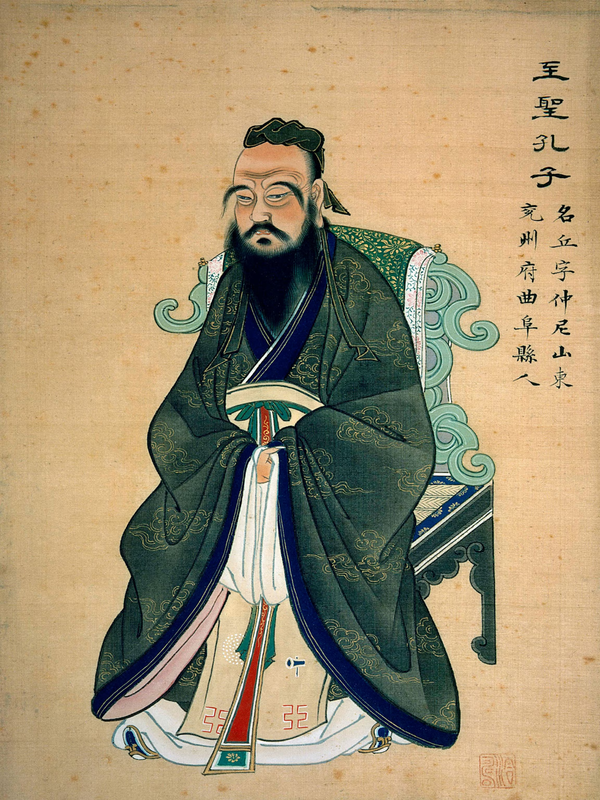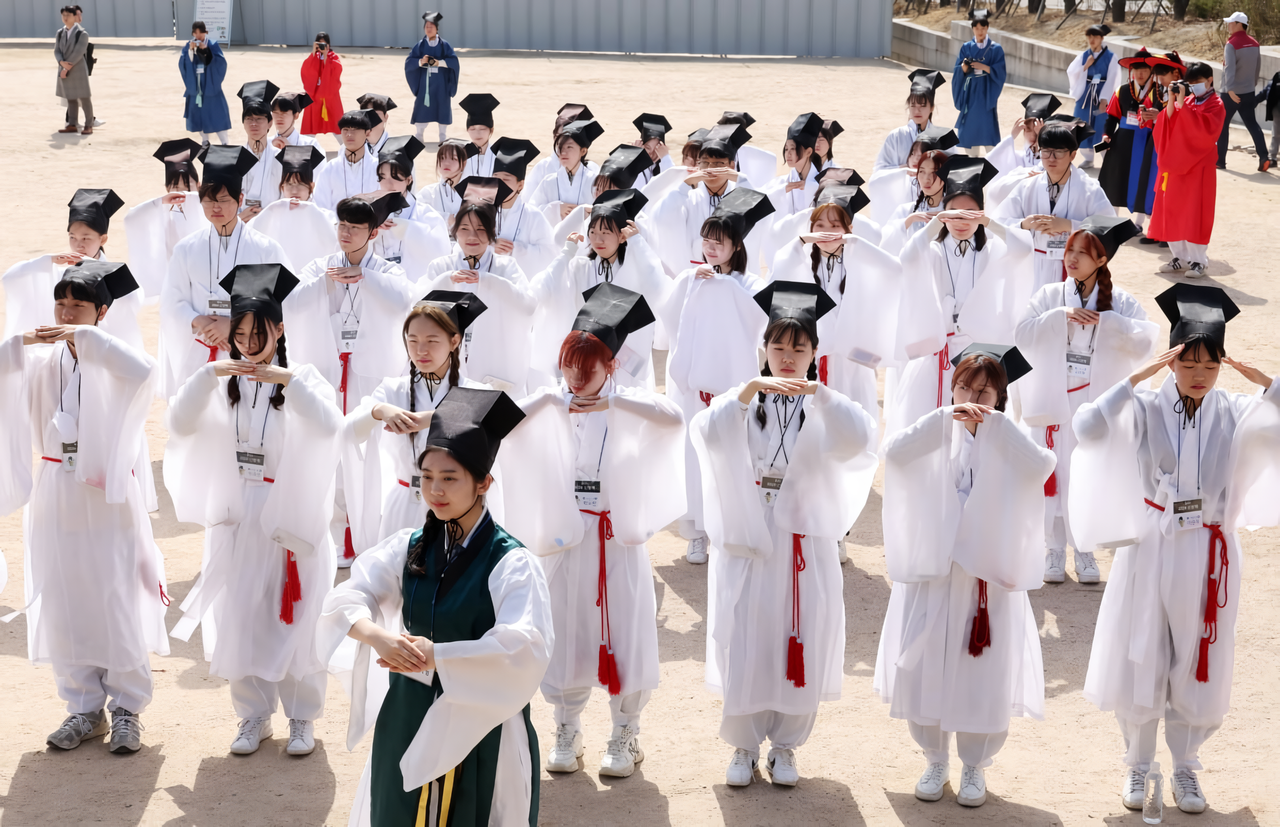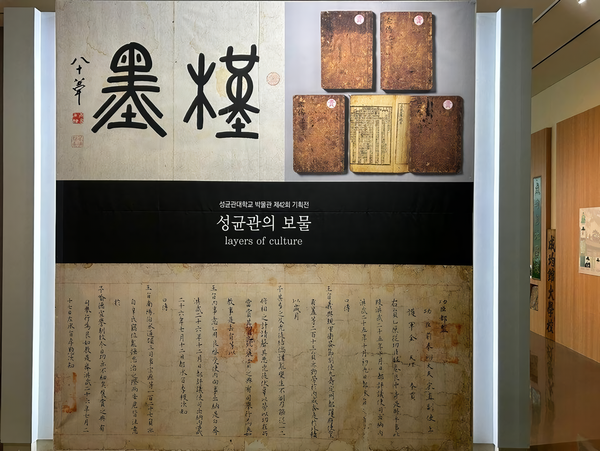As autumn slowly reveals itself with vibrant hues, countless people gravitate towards Sungkyunkwan University’s (SKKU) cherished gem, the Myeongnyundang. Renowned for its majestic ginkgo tree and resonating whispers of history, the Myeongnyundang is a testament to SKKU’s rich heritage and deep Confucian roots. Join the Sungkyun Times (SKT) as it explores how SKKU keeps its valuable tradition alive on campus today.
Connecting the Past and the Present

Recognized as one of the most influential philosophies of East Asia, Confucianism is a system of beliefs based on the teachings of Confucius, a renowned philosopher from ancient China. It is mainly centered on humanism, and it emphasizes the inner virtues and interpersonal rules necessary for a harmonious society. Confucianism entered South Korea as early as the Three Kingdoms of Korea period, roughly 2000 years ago, and it was integrated into the curriculum of national education in the following dynasties. In 1308, during the Goryeo Dynasty, the term Sungkyunkwan was first used to name the kingdom’s institution of higher education. When Joseon was founded with Confucianism as its state ideology, as the kingdom’s foremost educational institute, Sungkyunkwan became the central hub of researching and distributing Confucianism. In 1398, the campus of Sungkyunkwan was relocated to its current location in Seoul City, officially acknowledged as the origin of SKKU. Since then, it underwent a series of physical and structural changes due to political circumstances until it was formally authorized as modern-day SKKU by the former Ministry of Education in 1946. Although it widened the scope of its education from traditional Confucian teachings to a more comprehensive curriculum over the years, Sungkyunkwan preserved Confucian legacy, shaping the unique features of SKKU today. For one, the school’s motto In, Ui, Ye, Ji reflects the basic principles of Confucianism, which respectively mean humanity, righteousness, propriety, and wisdom. Furthermore, SKKU is the only university in South Korea that observes the birthday of Confucius as a school holiday, allowing students and faculty to rest on September 28th every year.
Confucianism Today at SKKU
-Lies in Education
While the emphasis on practicing Confucianism has generally dwindled nationwide, SKKU continues to maintain its role of providing quality education on the topic. First, the College of Confucian Studies and Eastern Philosophy offers undergraduate and graduate programs for students aspiring to become experts in this East Asian cultural ideology. In the Department of Confucian and Oriental Studies, the only undergraduate program in Korea dedicated solely to the field, students take courses such as Understanding the Confucian Classics, Debate on Korean Neo-Confucianism, and more. Secondly, Confucianism is included in the academic path for all students, even those outside the department. At SKKU, undergraduate students are required to earn two credits in the Sungkyun Humanity and Leadership field, which students have the option to fulfill by taking The Analects of Confucius class. The Analects of Confucius is a unique course that embodies the identity of SKKU, and according to the Sungkyun Confucianism Humanity Education Center, approximately 2,000 students take it each semester. Although specific arrangements differ by professor, the course framework is aligned to explain the implications and importance of In, Ui, Ye, Ji. Also, the Sungkyun-saek midterm essay is mandatory for all classes, an assignment in which students can personally reflect on Confucian teachings. These meaningful education opportunities elevate the campus experience at SKKU and bring about a sense of heritage in the Kingos’ journey of studies.
-Dwells among People

SKKU holds various interactive cultural events that blend the past with the present. For instance, every March, it hosts a modified version of the Shinbangrye, which historically was an informal freshmen welcoming ceremony at Sungkyunkwan in which the seniors and freshmen shared conversations and food. This year, 200 SKKU freshmen participated in the Shinbangrye, participating in both creative mission games and historical rituals, such as offering greetings to Confucius. Another notable example is the Gohanora, which is held every autumn. It is a parade festival that inherits the tradition of Yusaengs, the Sungkyunkwan scholars during the Joseon Dynasty, petitioning to the king. In accordance with the Yusaengs’ petitioning, an idea contest called the Youth Appeal Project is held before each Gohanora to collect proposal suggestions on specific themes, and this year’s theme was the Mutual Development of Universities and Local Regions. On the day of the Gohanora, participants clothed in colorful traditional costumes march along the streets of Jongno District, singing and dancing in ensemble. When they reach their final destination, the winning proposal is presented to government officials, and various performances are held on stage. Behind these special programs is SKKU’s official student club, Cheong Lang, formally known as the Yusaeng Culture Development Team. Its name directly translates to “blue wave,” representing the color of the unique clothing the Yusaengs wore. In an interview with the SKT, Cheong Lang explained that its main goal is “to carry on the legacy of the Yusaengs by redesigning and holding ceremonies that they took part in centuries ago.” It also asserted, “The club’s overall framework and terminology are firmly rooted in documented historical evidence, carefully verified by our research team, and modern culture is incorporated to make Confucianism more accessible and engaging for students.” Through these efforts, SKKU’s Cheong Lang creates a one-of-a-kind campus culture and instills school pride in Kingos’ hearts.
-Abides as Heritage
Last but definitely not least, the physical remains of Sungkyunkwan are well preserved on campus. For one, the historic site of the old Sungkyunkwan campus is mostly intact even to this day. Some of the buildings at the site today include the Jongyeonggak, the oldest library in Korea; the Myeongnyundang, the main lecture hall; and the Daeseongjeon, the shrine that holds the memorial tablets of Confucius and his followers. At the Daeseongjeon, SKKU’s special ritual known as the Goyurye is performed before significant school events, such as admissions, graduations, and construction of new buildings, informing ancestors of the upcoming agenda. Next, the SKKU Museum houses and displays valuable artifacts from ancestors thousands of years back. Established in 1964, the SKKU Museum is currently located on the B1 floor of the 600th Anniversary Hall and is open to the public on weekdays from 10 a.m. to 4 p.m. The museum’s permanent exhibition includes a collection of cultural and artistic items. Particularly, in the Donation/Campus Room, the history of SKKU is visibly laid out with various artifacts that span from 1398 to recent years, and in the Confucian Culture Room, the lifestyle of the Joseon scholars is illustrated with everyday items that they used in real life. It also holds special exhibitions annually, and the 42nd special exhibition titled Treasures of Sungkyunkwan, Layers of Culture was open for visitors from 2023 May to March this year. These important heritage preservations offer a tangible connection to SKKU’s Confucian roots for its students and the wider community.

Blueprints for Progress
Today, as the educational system and student activities are fairly effective in preserving school identity, it is advisable that SKKU pursue gateways to build on this success. In an interview with the SKT, Hwang Su-eun (Sophomore, Department of History) stated, “Confucianism is a big part of SKKU spirit, and I hope the school continues to invest in its programs and actively encourage greater student participation.” Meanwhile, due to insufficient promotion, many students are relatively unaware of the presence of the SKKU Museum, which highlights the need for new methods to attract visitors. Incorporating museum tours into courses related to Confucianism could greatly enhance student engagement, just as Professor Lee Cheon-seung takes his students to the museum and provides insightful explanations about the exhibitions in his Analects of Confucius class. Also, to increase the awareness of new special exhibitions, the school should actively promote them through various channels. Finally, in order to further attract students, student clubs could develop interactive programs that encourage participation in the museum, with fun missions and challenges, and these could mainly be effective during significant Confucian occasions, such as around Confucius’s birthday. Such efforts to promote the SKKU Museum will surely enhance its role on campus. Above all, SKKU must continue upholding the core principles of Confucianism but also adapt to contemporary trends, preserving and sharing the university’s unique legacy for generations to come.
Confucianism serves as a vital link between former and current SKKU, perfectly reflecting its slogan, “Unique Origin, Unique Future.” Just as Confucius loved reading, reflecting, and teaching his students under ginkgo trees, the SKT encourages Kingos to take a moment this autumn to immerse themselves in the wisdom of Confucianism, beneath the vibrant ginkgo leaves of SKKU.
